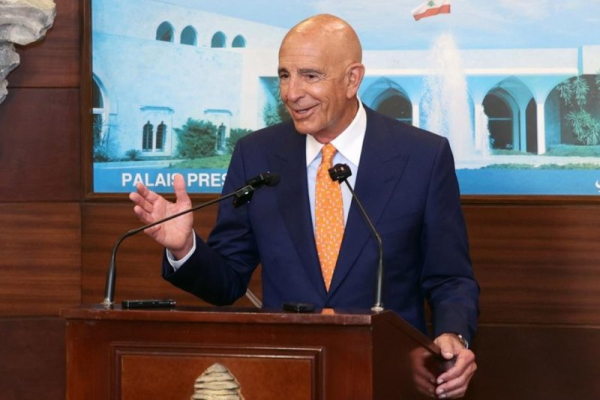

U.S. Ambassador to Turkey and Special Envoy to Syria Thomas Barrack speaks during a news conference after a meeting with the Lebanese president at the presidential palace in Baabda, east of Beirut, Lebanon, on Monday. Barrack is on an official visit to Lebanon to meet with Lebanese leaders. Photo by Lebanese Presidency Press Office/EPA
U.S. special envoy Thomas Barrack said Monday he was “unbelievably satisfied” with Lebanon’s response to Washington’s proposals to disarm Hezbollah, saying Israel seeks peace with its neighbor and Hezbollah needs to see that there is a path forward for them.
Barrack, however, warned that war-ravaged Lebanon risks being left behind if it fails to seize the current opportunities with the region changing at high speed.
The envoy, who was speaking after a meeting with Lebanese President Joseph Aoun shortly after his arrival in Beirut, praised the Lebanese officials for presenting “a thoughtful and considered” seven-page response to his June 19 roadmap.
His initial proposals include a phased approach to disarm Hezbollah and other militant groups, the implementation of necessary reforms to unlock funds for reconstruction and help solve its acute financial crisis as well as the need to improve ties with neighboring Syria.
According to a statement released by the Presidential Palace, Barrack was handed over Lebanon’s reply with “ideas for a comprehensive solution.”
“We are creating a go-forward plan. To create that, we need dialogue. What the government gave us was something spectacular,” Barrack said. “We are both committed to get to the details and get a resolution. So, I am very, very hopeful.”
He said the mechanism set up to monitor the Nov. 27 cease-fire accord that ended 14 months of a devastating Israel-Hezbollah war “wasn’t sufficient” and “had no ability to correct a default,” referring to the mistrust between Israel and Hezbollah.
Israel has continued striking southern Lebanon and other areas of the country since the cease-fire accord, which was brokered by the United States and France, went into effect Feb. 18. It has also refused to fully withdraw and retained five strategic positions inside south Lebanon to force the full disarmament of Hezbollah.
More than 200 Lebanese civilians and Hezbollah field commanders were killed in the ongoing strikes, which Israel claims to target suspected Hezbollah positions and foil the group’s attempts to reorganize its ranks and rearm in violations of the cease-fire accord. Lebanon and Hezbollah on their part recorded more than 3,700 Israeli violations.
In line with the cease-fire agreement, the Lebanese Army has taken control of most of Hezbollah’s positions and military facilities, pushing the militant group away from the border with Israel and preventing it from having a military presence south of the Litani River. The Army could not complete its deployment because of Israel’s continued occupation of the five points inside south Lebanon.
Prime Minister Nawaf Salam explained after a meeting with the U.S. envoy that Barrack “wouldn’t have come with new ideas” if the mechanism to monitor the ceasefire succeeded in ending the ongoing hostilities.
“These are ideas for implementing the cessation of hostilities arrangements … based on the principle of parallel and reciprocal steps — not that Israel withdraws first and then we start talking about the issue of exclusive arms control, or that if there is no exclusivity of arms, Israel doesn’t withdraw,” Salam said.
“That’s not how this process works. There are interlinked steps that unfold over time.”
He said Lebanon’s demands include the necessity of a full Israeli withdrawal from all Lebanese territory, a comprehensive and complete cessation of hostile activities, the immediate start of reconstruction efforts and the release of the remaining Lebanese prisoners held by Israel.
“The exclusivity of weapons must be in the hands of the Lebanese state, and it alone must reclaim the decision over war and peace,” Salam said. “This authority must lie solely with the Lebanese state, without any partnership with any other party.”
On Sunday, Hezbollah leader Sheikh Naim Qassem said his group, which has repeatedly refused to lay down arms, was ready for both choices: peace and building Lebanon, but also for defending it and confronting Israel until it ends its air strikes and pulls out from south Lebanon.
The U.S. envoy said there is “an opportunity in the air,” calling on Lebanon not to miss it as the region is changing and “everything is moving at warp speed.”
Barrack said that he believes Israel wants peace, not war, with Lebanon while Hezbollah needs to see that “there is a future for them … that there is an intersection of peace and prosperity for them.”
“It has been a nightmare on both sides, for both countries and everybody is tired of it,” he said. “I think both countries are trying to give the same thing: the notion of a stand down agreement of the cessation of hostilities and a road to peace… but everybody will have to give up something.”
Barrack said while Syria “went from absolute chaos to hope of the world standing behind it” and started a dialogue with Israel, Lebanon “can’t be left behind.”
He warned Lebanon that the region “the region is moving at mach speed,” and will be “left behind sadly” if it refuses to change.
But if it does change, Barrack said Washington will support it, adding that U.S. President Donald Trump “for some reason, believes that Lebanon still is the key to the region and can be the Pearl of the Mediterranean.”